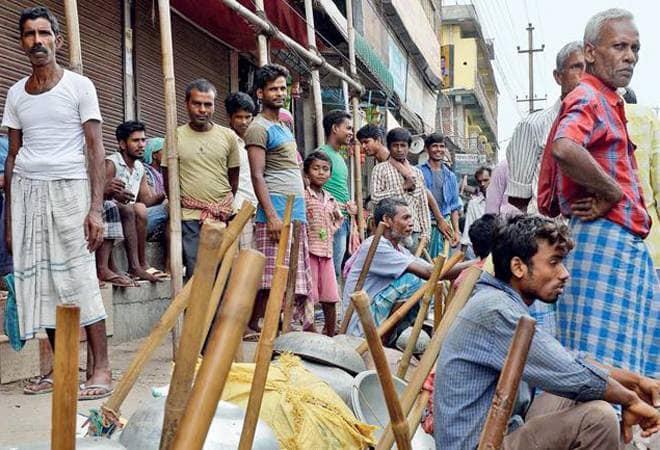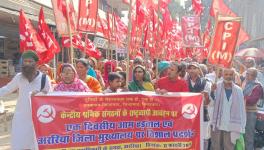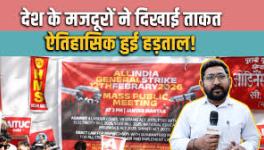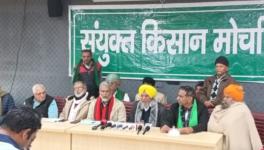'Proposed Labour Codes Will Further Destroy Workers’ Rights’

Representational Image. Image Courtesy: Business Today
New Delhi: Opposing the Narendra Modi government’s move to get the proposed labour codes enacted by Parliament, several trade union leaders and labour rights activists said it would ruin the entire labour law architecture in the country and squeeze trade unions out of existence.
“The proposed codes reflect an evil design to do away with all labour protection,” senior advocate Colin Gonsalves, warned in a seminar held here recently under the aegis of the Delhi Union of Journalists (DUJ), the Kerala Union of Working Journalists and the National Alliance of Journalists.
Referring to the Industrial Relations Code, Gonsalves said with the Registrar of Trade Unions being given arbitrary powers to refuse registration, it would become virtually impossible to register new unions, adding that the existing trade unions would be tied up in chains with the government deciding who can be office-bearers, how many of them can be from within an establishment and without.
“Government would control spending of money by unions, with big fines for helping solidarity strikes. The fines would be punitive, with any minor irregularities (not illegalities) in record keeping being punished with fines of five to ten lakhs or more. This is in sharp contrast to the way in which corporates are allowed to get away with fudged records and falsification of accounts. No managing director of a company and no auditor pays such fines,” he said.
Among those who addressed the seminar were leaders of several Central trade unions, such as Deepak Sharma of the Indian National Trade Union Congress (INTUC), Swadesh Dev Roye of the Centre for Indian Trade Unions (CITU) and Vidya Sagar Giri of the All India Trade Union Congress (AITUC). Other trade union speakers included Pawan Kumar of the Bharatiya Mazdoor Sangh (BMS) as well as Shyambir of the Inklabi Mazdoor Sangam Kendra. #
Gonsalves said talking about a national minimum wage was pointless as this and other rights would not be enforcible through labour courts. Further, the entire system of labour inspection would be replaced by self-certification. “This would mean that company owners would be able to say they have less than 10 workers and are exempt from various laws while they actually have a hundred workers. But there will be no one to inspect and find out the truth, no one to enforce any law,” he added.
Speakers also pointed out that among the 44 Labour Acts on the chopping block are the Working Journalists & Other News Paper Employees (Conditions of Service & Miscellaneous Provisions) Act, 1955 and The Working Journalists (Fixation of Wages) Act, 1958, which are the “bedrock of the newspaper industry, setting basic standards, wages, working hours, night shift hours and entitlements like earned leave, medical leave, provident fund, maternity benefits etc.”
S.K.Pande, DUJ President read out a letter from the Labour Ministry that said that there would be no announcement of a new wage board as the Working Journalists Act is to be subsumed in the Labour Codes. He called for a united front, based on phased struggle, of journalists and press workers to save the media industry from the “jungle law of hire and fire.” Incidentally, the latest sackings making ripples in the industry have taken place in the newly launched TV channel, Tiranga.
Dev Roy said a low minimum wage will only lower wages around the country. He pointed out that the nomenclature itself was dangerous, with statutes being replaced by codes. He warned that the big danger lay in the forthcoming Code on Industrial Relations that will do away with basic working class rights including the right to form trade unions, the right to collective bargaining and the right to strike.
Deepak Sharma of INTUC asked why compress the sea of labour laws? He said there was no proper consultation with Central TUs, and that the changes in labour laws were entirely for the benefit of the business class.
Vidya Sagar Giri of AITUC said the government is flouting the core ILO Conventions although it was a signatory to several of them. The ILO’s Centenary Declaration of 2019 clearly says that all governments are bound to implement the ILO’s fundamental principles including the right to association. However, the proposed Industrial Relations Code will demolish this right, he added.
Shyambir of the Inkalabi Mazoor Kendra said the government is attacking the rights of the working class by bringing in new provisions such as ‘fixed term employment’ instead of permanent jobs. He pointed out that no worker on a fixed term contract would be willing to join a union and fight for rights. He also referred to the damage being done by the Pradhan Mantri Kaushal Vikas Yojana that promotes apprenticeship rather than jobs. Why should workers be exploited as apprentices for three years, he asked.
Pawan Kumar, organising secretary of BMS, an RSS affiliate, said is organisation was not opposed to simplification or codification of the laws as long as workers’ rights were protected. He welcomed the Wage Code Bill but questioned the formula for fixation of a minimum wage, pointing out that the old formula assumed a worker’s wage would support a family of three units.
Striking a different note, senior journalist Paranjoy Guha Thakurta spoke of the growing attacks on the media and the attempts to control the media through various means, including squeezing it financially. He pointed out that the biggest advertiser today is the government, followed by the Bharatiya Janata Party.
“The government holds the purse strings and has recently denied advertising to three of the most prominent media groups, the Times of India group, the Hindu and the Anand Bazar group…” he said, adding that pressure was being built on all these groups. He said the media had never before been muzzled like this. He also spoke of the misuses of social media, particularly during the elections and the spread of violence and hate through Facebook and Whatsapp campaigns. He regretted that the Internet is no longer the hoped for ‘universal commons’ but was controlled by half a dozen multinational corporations.
Get the latest reports & analysis with people's perspective on Protests, movements & deep analytical videos, discussions of the current affairs in your Telegram app. Subscribe to NewsClick's Telegram channel & get Real-Time updates on stories, as they get published on our website.
























